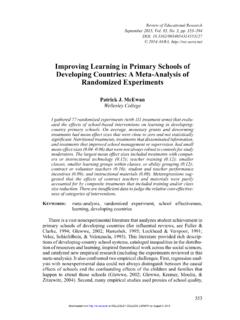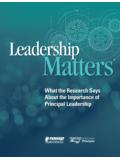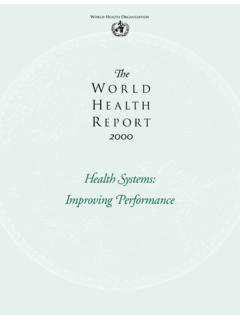Transcription of EVALUATION AND ASSESSMENT FRAMEWORKS FOR …
1 EVALUATION AND ASSESSMENT FRAMEWORKS FOR improving SCHOOL OUTCOMES COMMON POLICY CHALLENGES SUMMARY Performance in schools is increasingly judged on the basis of effective learning outcomes. Information is critical to knowing whether the school system is delivering good performance and to providing feedback for improvement in student outcomes. The OECD has launched the Review on EVALUATION and ASSESSMENT FRAMEWORKS for improving School Outcomes to provide analysis and policy advice to countries on the following overarching policy question: How can ASSESSMENT and EVALUATION policies work together more effectively to improve student outcomes in primary and secondary schools? Countries use a range of techniques for the EVALUATION and ASSESSMENT of students, teachers, schools and education systems.
2 Many countries test samples and/or all students at key points, and sometimes follow students over time. International assessments such as PISA provide additional information and useful external comparators. Some countries also use inspection services to evaluate teachers and/or schools and teacher EVALUATION is becoming more widely used. In all countries, there is widespread recognition that EVALUATION and ASSESSMENT FRAMEWORKS are key to building stronger and fairer school systems. Countries also emphasise the importance of seeing EVALUATION and ASSESSMENT not as ends in themselves, but instead as important tools for achieving improved student outcomes.
3 Although each country context is unique, some common policy challenges are emerging from the OECD s Review. These can be grouped under five main headings. Governance and Implementation The common policy challenges that emerge concerning governance and implementation are: ensuring articulations within the EVALUATION and ASSESSMENT framework ; developing competencies for EVALUATION and for using feedback; securing links with classroom practice; and overcoming the challenges of implementation. Student ASSESSMENT Several common policy challenges arise concerning student ASSESSMENT : aligning educational standards and student ASSESSMENT ; balancing external assessments and teacher-based assessments in the ASSESSMENT of learning and integrating student formative ASSESSMENT in the EVALUATION and ASSESSMENT framework .
4 Teacher EVALUATION Common policy challenges in teacher EVALUATION are: combining the improvement and accountability functions of teacher EVALUATION ; accounting for student results in EVALUATION of teachers; and using teacher EVALUATION results to shape incentives for teachers. School EVALUATION School EVALUATION presents common policy challenges concerning: aligning external EVALUATION of schools with internal school EVALUATION ; providing balanced public reporting on schools and improving data handling skills of school agents. System EVALUATION Common policy challenges for EVALUATION of education systems are: meeting information needs at system level; monitoring key outcomes of the education system; and maximising the use of system-level information.
5 This Issues Note covers each of these challenges in turn and presents information about the Review itself. For additional information, see the OECD website or contact 2 INTRODUCTION The OECD s Education Policy Committee launched the Review on EVALUATION and ASSESSMENT FRAMEWORKS for improving School Outcomes in 2009 to provide analysis and policy advice to countries on how different ASSESSMENT and EVALUATION tools can be embedded within a consistent framework to bring about real gains in performance across the school system. The Review includes a thorough analysis of the evidence on EVALUATION and ASSESSMENT , in-depth review of EVALUATION and ASSESSMENT policies in a range of countries and a synthesis report comparing country experience and drawing out general lessons for policy development.
6 This Issues Note outlines common policy challenges emerging from the analysis undertaken in the Review and is designed to stimulate discussion about EVALUATION and ASSESSMENT policies among and within countries as the review proceeds. GOVERNANCE AND IMPLEMENTATION Ensuring articulations within the EVALUATION and ASSESSMENT framework Every country typically has provisions for student ASSESSMENT , teacher EVALUATION , school EVALUATION and system EVALUATION , but often these are not explicitly integrated and there is no strategy to ensure that the different components of the framework can mutually reinforce each other. A strategic approach to the development of the EVALUATION and ASSESSMENT framework provides an opportunity to reflect on the articulations between the different EVALUATION components.
7 For example, there might be room for increased integration between teacher EVALUATION , school EVALUATION and school development, between the EVALUATION system and overall educational research, between EVALUATION and the labour market, and so on. Policy development needs to involve a reflection on the different components of the framework such as school ASSESSMENT , teacher appraisal, or standardised national-level student tests to assess students progress, and ways in which they can be articulated to achieve the purposes of the framework . The key aspect is to determine how the different components need to be interrelated in order to generate complementarities, avoid duplication, and prevent inconsistency of objectives.
8 Developing competencies for EVALUATION and for using feedback The effectiveness of EVALUATION and ASSESSMENT relies to a great extent on ensuring that both those who design and undertake EVALUATION activities as well as those who use their results possess the proper skills and competencies. This is crucial to provide the necessary legitimacy to those responsible for EVALUATION and ASSESSMENT . Since EVALUATION has strong stakes for the units assessed and since school outcomes heavily depend on individual relationships and cooperation at the school level, successful feedback mechanisms require particular attention to developing competencies and defining responsibilities in the EVALUATION process.
9 In addition, competencies for using feedback to improve practice are also vital to ensure that EVALUATION and ASSESSMENT procedures are effective. ASSESSMENT for improvement requires the inclusion of actors such as teachers in the process of school development and improvement. As a result, for instance, it is pertinent to include training for EVALUATION in initial teacher education alongside the development of research skills. Similarly, the preparation to become a school leader is expected to include educational leadership with some emphasis on feedback mechanisms. Particular groups such as inspectorates are also in a good position to engage in modelling and disseminating good practice in areas such as school ASSESSMENT and teacher appraisal.
10 Securing links with classroom practice EVALUATION and ASSESSMENT FRAMEWORKS have no value if they do not lead to the improvement 3 of classroom practice and student learning. Securing effective links to classroom practice is a key policy challenge in the design of EVALUATION and ASSESSMENT FRAMEWORKS . A number of strategies can reinforce the linkages between the EVALUATION and ASSESSMENT framework and classroom practice. A strong emphasis on teacher EVALUATION for the continuous improvement of teaching practices within the school is one key link. Another lever is to involve teachers in school EVALUATION , in particular through conceiving school self- EVALUATION as a collective process with responsibilities for teachers.
















